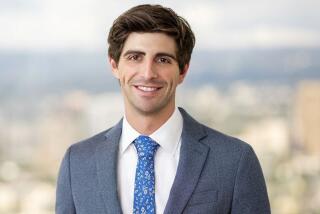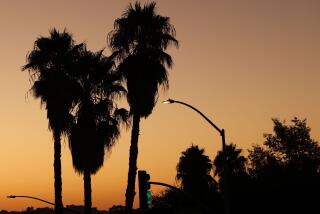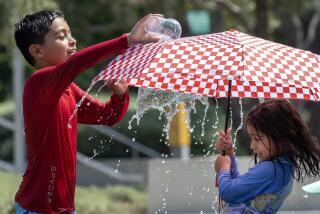LOS ANGELES MARATHON : Drought Returns for a Day in L.A. : Weather: Soaring temperatures make for an increase in water usage by runners and some spots run out.
Moments after entertainer Della Reese gave thanks for the “marvelous weather” Sunday in an invocation at the starting line of the Los Angeles Marathon, runners found themselves in a battle against the heat.
To make matters worse, water became a scarce commodity along the course in the early afternoon. Stations at the 10th, 12th and 18th miles ran out of water.
At 1 p.m., it was 87 degrees at the Los Angeles Civic Center, making it the hottest day in the history of the L.A. Marathon.
Optimal conditions for a marathon are considered to be 50 to 60 degrees, with cloud cover.
The temperature was 71 degrees when the race began just after 9 a.m. in front of the Coliseum. By 1 p.m., with thousands of runners still struggling along the course, the heat hit its peak.
At the beginning of the race, there were 15,000 servings of water at each station. Runners were advised to drink water at every station.
Apparently, the 19,073 runners heeded the advice, and there was not enough to go around.
When it was discovered that the water stations had gone dry, race officials loaded flatbed trucks with remaining water from the stations at the beginning of the race and redistributed it to the stations toward the end of the course.
At the request of race officials, Mayor Tom Bradley ordered several street hydrants opened. Race volunteers filled cups of water from the hydrants for the runners.
For the handful of elite runners in front of the pack, water was not a problem. The heat, however, made for a slow race.
“It was unexpectedly very hot and, of course, it influenced the race very much,” said Lubov Klochko, who won the women’s division.
John Treacy, winner of last year’s marathon, said the race “definitely” should be started earlier in the day, “not so much for us (elite runners), but for the people who run five- and six-hour marathons.”
Treacy finished fifth.
Bill Burke, president of the L.A. Marathon, noted that Los Angeles is the earliest-starting major-city marathon. The Boston Marathon and the New York Marathon start later in the day.
In Boston, which is run in April, and New York, which is run in November, the weather is typically cooler.
Fred Lebow, director of the New York Marathon, knows the dangers of hot weather. In the 1984 New York Marathon, the temperature reached 80 degrees and one runner died.
“I feel sorry for the organizers (of the L.A. Marathon),” said Lebow, who ran in the 5K/Los Angeles, held in conjunction with the marathon. “You can prepare for everything, but you can’t prepare for the sun.”
Yvonne Murray of Scotland won the women’s division of the 5K, and Phillimon Hannecke of El Paso won the men’s division.
Hannecke’s time was 13:27. Murray, the bronze medalist in the 1988 Olympics in the 3,000 meters, finished the 5K in 15:22.
More to Read
Sign up for Essential California
The most important California stories and recommendations in your inbox every morning.
You may occasionally receive promotional content from the Los Angeles Times.










